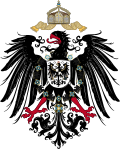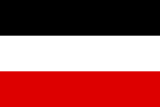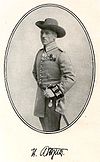German Empire


The German Empire (German: Deutsches Kaiserreich, officially Deutsches Reich), was the German nation state that existed from the Unification of Germany in 1871 until the abdication of Kaiser Wilhelm II in 1918.
The German Empire consisted of 26 states, most of them ruled by noble families. They included four kingdoms, six grand duchies, five duchies (six before 1876), seven principalities, three free Hanseatic cities, and one imperial territory. Although Prussia was one of several kingdoms in the realm, it contained about two thirds of Germany's population and territory.
After 1850, the states of Germany had rapidly become industrialized, with particular strengths in coal, iron (and later steel), chemicals, and railways. In 1871, Germany had a population of 41 million people; by 1913, this had increased to 68 million. A heavily rural collection of states in 1815, the now united Germany became predominantly urban. During its 47 years of existence, the German Empire was an industrial, technological, and scientific giant, gaining more Nobel Prizes in science than any other country.
Selected article
The Harden–Eulenburg affair, often simply Eulenburg affair, was the controversy surrounding a series of courts-martial and five civil trials regarding accusations of homosexual conduct, and accompanying libel trials, among prominent members of Kaiser Wilhelm II's cabinet and entourage during 1907–1909.
The affair centred on journalist Maximilian Harden's accusations of homosexual conduct between Philipp, Prince of Eulenburg, and General Kuno, Graf von Moltke. Accusations and counter-accusations quickly multiplied, and the phrase "Liebenberg Round Table" came to be used for the homosexual circle around the Kaiser. The affair received wide publicity and is often considered the biggest domestic scandal of the German Second Empire. It led to one of the first major public discussions of homosexuality in Germany, comparable to the trial of Oscar Wilde in the United Kingdom. The incident which provoked the affair followed on the heels of a public relations gaffe by Wilhelm II. Briefly, in November 1908, Wilhelm II began a vacation at an aristocrat's estate in the Black Forest. One evening after dinner, chief of the Military Secretariat Dietrich von Hülsen-Haeseler was performing a pas seul dressed in a woman's ballet tutu when his heart failed and he died. Ottokar von Czernin, also in attendance, remarked, "In Wilhelm II, I saw a man who, for the first time in his life, with horror-stricken eyes, looked upon the world as it really was." Despite the Emperor's fears, the incident, with its implications of homosexuality at high levels, seemed successfully hushed up.
Selected biography

Hermann Detzner (16 October 1882 – 1 December 1970) was an officer in the German colonial security force (Schutztruppe) in Kamerun (Cameroon) and German New Guinea, as well as a surveyor, an engineer, an adventurer, and a writer. In early 1914, the German government sent Detzner to explore and chart the interior of Kaiser-Wilhelmsland, the imperial protectorate on the island of New Guinea. When World War I broke out in Europe, he was well into the interior and without radio contact. He refused to surrender to Australian troops when they occupied German New Guinea, concealing himself in the jungle with a band of approximately 20 soldiers. For four years, Detzner and his troops provocatively marched through the bush, singing "Watch on the Rhine" and flying the German Imperial flag. He led at least one expedition from the Huon Peninsula to the north coast, and a second by a mountain route, to attempt an escape to the neutral Dutch colony to the west. He explored areas of the New Guinean interior formerly unseen by Europeans and surrendered in full dress uniform, flying the Imperial flag, to Australian forces in January 1919.
Selected images
Did you know?

- ...that the DFB (Deutscher Fußball-Bund) was founded on 28 January 1900 in Leipzig by representatives of 86 clubs? The German national team played its first game in 1908.
- ...that Pickelhauben were popular targets for Allied souvenir hunters during the early months of the war? The spiked helmet remained part of a clichéd mental picture of Imperial Germany as late as the inter-war period even after the actual headdress had ceased to be worn.
Subcategories
Clicking the ► sign will expand or collapse the respective category.
Topics
States of the German Empire
Kingdoms
Grand Duchies
- Grand Duchy of Baden
- Grand Duchy of Hesse
- Grand Duchy of Mecklenburg-Schwerin
- Grand Duchy of Saxe-Weimar-Eisenach
- Grand Duchy of Mecklenburg-Strelitz
- Grand Duchy of Oldenburg
Duchies
- Duchy of Brunswick
- Duchy of Saxe-Altenburg
- Duchy of Saxe-Meiningen
- Duchy of Saxe-Coburg and Gotha
- Duchy of Anhalt
- Duchy of Saxe-Lauenburg
Principalities
- Principality of Schwarzburg-Sondershausen
- Principality of Schwarzburg-Rudolstadt
- Principality of Waldeck-Pyrmont
- Principality of Reuss-Greiz
- Principality of Reuss-Gera
- Principality of Schaumburg-Lippe
- Principality of Lippe
Free and Hanseatic Cities
- Free and Hanseatic City of Lübeck
- Free and Hanseatic City of Bremen
- Free and Hanseatic City of Hamburg
Imperial Territories
Colonies of the German Empire
The German colonial empire (German: Deutsches Kolonialreich) constituted the overseas colonies, dependencies and territories of Imperial Germany. Short-lived attempts of colonization by individual German states had occurred in preceding centuries, but crucial colonial efforts only began in 1884 with the Scramble for Africa. Germany lost control when World War I began in 1914 and its colonies were seized by its enemies in the first weeks of the war. However some military units held out for a while longer: German South-West Africa surrendered in 1915, Kamerun in 1916 and German East Africa only in 1918 by end of the war. Germany's colonial empire was officially confiscated with the Treaty of Versailles after Germany's defeat in the war and the various units became League of Nations mandates under the supervision (but not ownership) of one of the victorious powers.

|

|

|

|

|

| |
| German New Guinea | German Samoa | German South-West Africa | Kamerun | Togoland | German East Africa |
Associated Wikimedia
The following Wikimedia Foundation sister projects provide more on this subject:
-
Commons
Free media repository -
Wikibooks
Free textbooks and manuals -
Wikidata
Free knowledge base -
Wikinews
Free-content news -
Wikiquote
Collection of quotations -
Wikisource
Free-content library -
Wikiversity
Free learning tools -
Wiktionary
Dictionary and thesaurus































